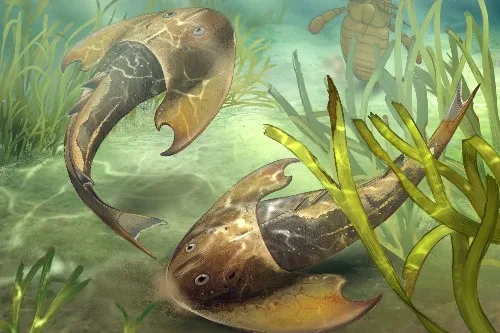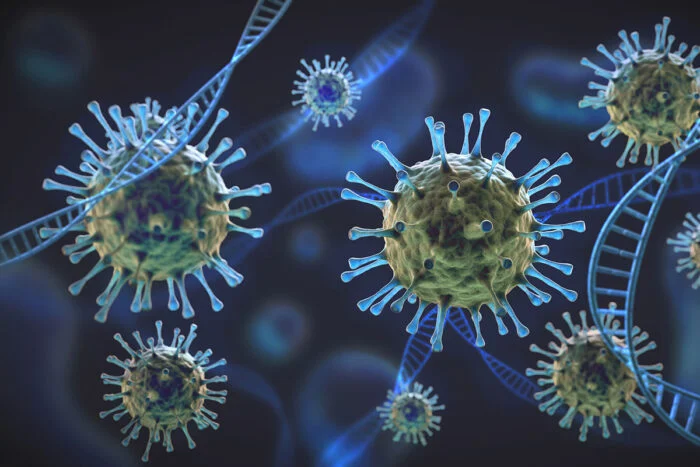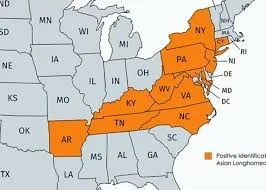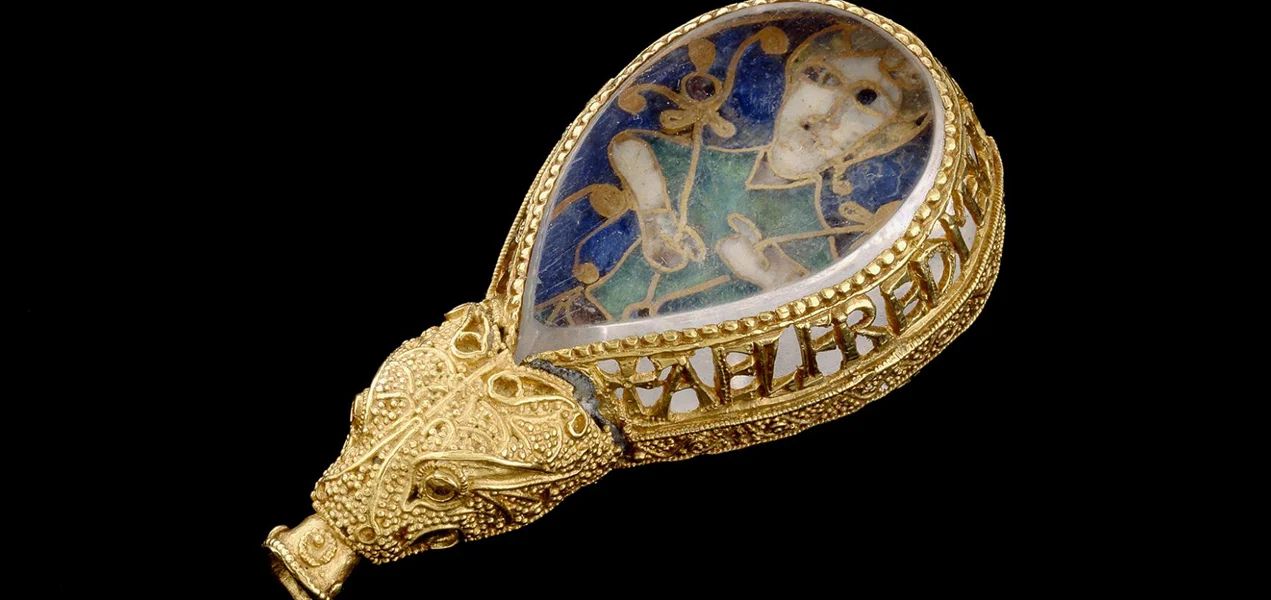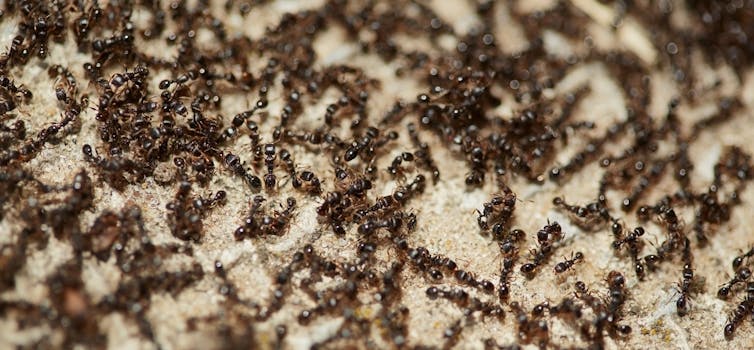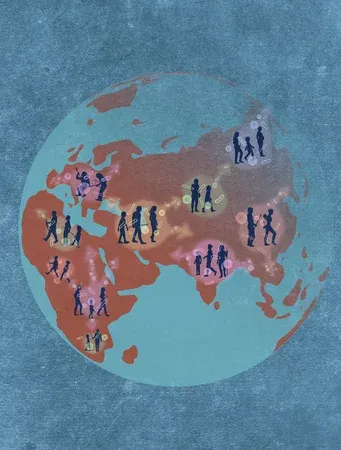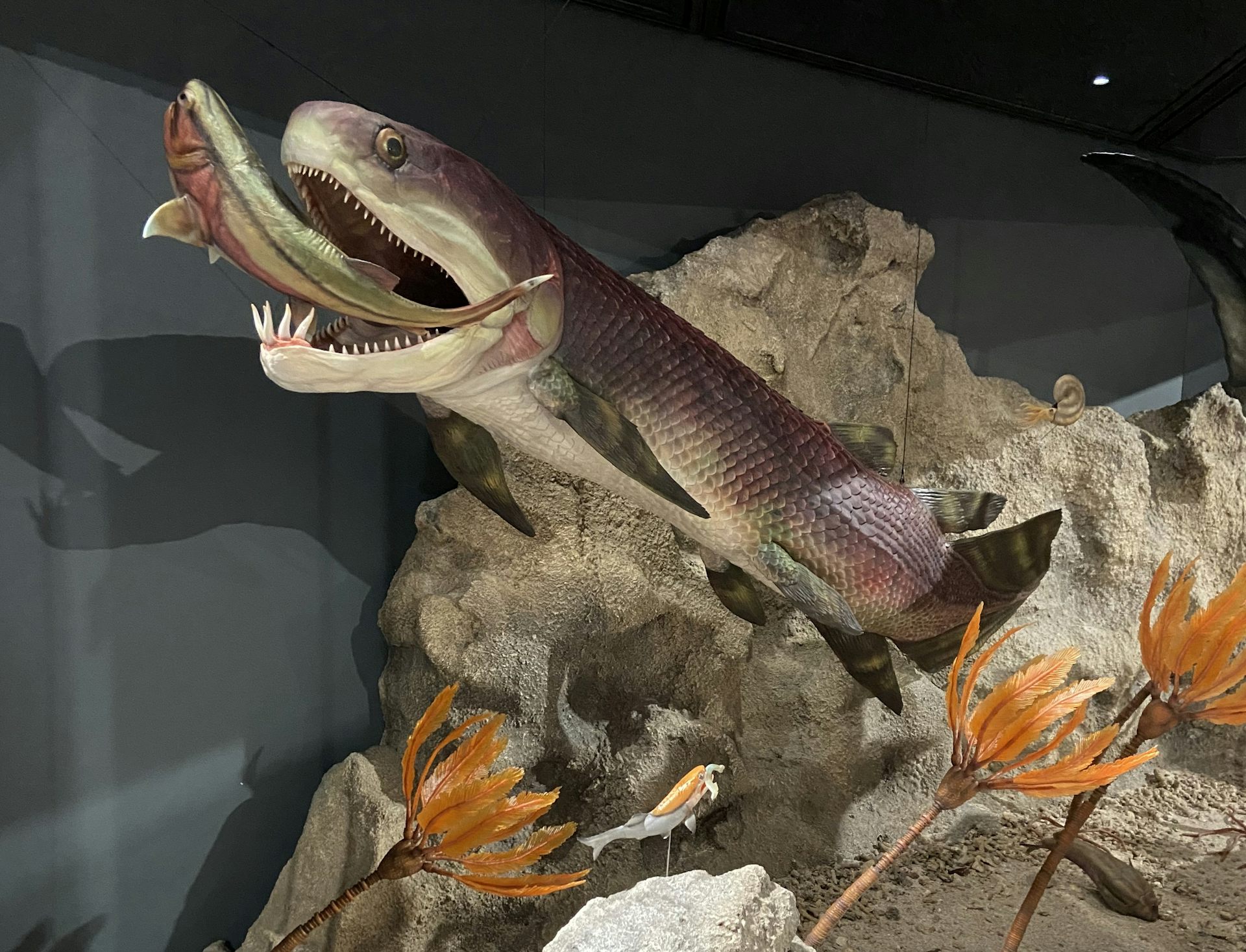
Ants following a scent trail
Many years ago, when I was a medical research technician for Oxford University, the lab I worked in suddenly had a problem with tiny yellow ants that were all over the place, so we called in a university entomologist. He identified them as pharaoh ants, a recently introduced species to the UK that was thriving in centrally-heated buildings.
We weren’t the only department with the problem because, as he explained, there was a large colony of possibly a billion individual ants somewhere in underground heating system that piped heating from a central boiler room serving many different buildings behind the Natural History and Pitt Rivers Museums, but they were harmless anyway, although it wasn't pleasant to find they'd discovered your pack of sandwiches and had laid a trail to it along which thousands were now streaming in a thin yellow line, carrying your lunch away, crumb by crumb. They especially liked ham, but wouldn't turn down cheese or egg.
We used to have a bit of fun with them, being research biologists. We would place a strip of paper across their trail and wait until they had found their way across it to pick up their trail on the other side and laid a new connecting scent trail on the paper, then we would move the paper several inches sideways and watch as they explored the paper to discover the trail across it now several inches away, cross it and then explore to find the old trail. Then we would remove the paper and watch as they still followed along where the edges of the paper strip had been to where the trail used to cross the paper strip, lay a new trail and follow back along what had been the edge of the paper to pick up their old trail. Sometimes an enterprising scout would find a shortcut and establish a new trail. In this way, we could create a complicated zig-zag trail and make them work for their free lunch! It would take them several hours to re-establish a shorter trail.
Incidentally, this also proved they were laying a trail of some sort. The trail could also be washed away with an alcohol swab, showing it was almost certainly a chemical of some sort.
But enough about the fun we had with our resident pharaoh ants.
Our billion-strong colony was a mere speck in the ocean, according to research by an Australian team. They have conservatively estimated that there are about 20 quadrillion ants alive on Earth at any one time - that's 20 followed by 15 zeros. Each of those ants will have about 250,000 brain cells alone and probably ten times as many other cells in their body. Each cell will contain hundreds, maybe thousands of proteins, each of which will need to be folded precisely to function correctly.
One of the tricks Creationists frauds fool their dupes with is to calculate how many different ways a protein can be folded then pretend to have estimated the chance of it being folded in exactly the right way to be vanishingly small, then hit their credulous audience with a false dichotomy fallacy and claim this proves the locally popular god must have arranged it.
Really? for every one of those sextillions of proteins in every one of those cells in all 20 quadrillion ants? And then there are the countless trillions of cells in other species! No wonder it doesn't have time to prevent children dying of malaria, AIDS or starvation in Africa!
You see, we can all play the big scary number tactic! But isn't it much more likely that the way proteins are folded is a function of the way they are manufactured by a cell, using nothing more complicated than the laws of chemistry and physics, than that it was all done by which ever deity the frauds are pushing, the existence of which and its modus operandum have never been demonstrated or witnessed?
So, leaving that major problem for Creations aside, how was the number, 20 quadrillion, arrived at for the Earthly population of ants, which incidentally means their combined weight of dry carbon is about 12 million tonnes, which exceeds that of all birds and mammals combined! The authors explain their methodology in an open access article in
The Conversation, reprinted below under a Creative Commons license, reformatted for stylistic consistency. The original article can be read
here.

Earth harbours 20,000,000,000,000,000 ants – and they weigh more than wild birds and mammals combined
Mark Wong,
The University of Western Australia;
Benoit Guénard,
University of Hong Kong;
François Brassard,
Charles Darwin University;
Patrick Schultheiss,
Julius Maximilian University of Würzburg;
Runxi Wang,
University of Hong Kong, and
Sabine Nooten,
Julius Maximilian University of Würzburg
Have you ever wondered exactly how many ants live on Earth? Possibly not, but it’s certainly a question we’ve asked ourselves.
Our
research published today provides an approximate answer. We conservatively estimate our planet harbours about 20 quadrillion ants. That’s 20 thousand million millions, or in numerical form, 20,000,000,000,000,000 (20 with 15 zeroes).
We further estimate the world’s ants collectively constitute about 12 million tonnes of dry carbon. This exceeds the mass of all the world’s wild birds and wild mammals combined. It’s also equal to about one-fifth of the total weight of humans.
Eminent biologist Edward O. Wilson once said insects and other invertebrates are “the little things that run the world” – and he was right. Ants, in particular, are a crucial
part of nature. Among other roles, ants aerate the soil, disperse seeds, break down organic material, create habitat for other animals and form an important part of the food chain.
Estimating ant numbers and mass provides an important baseline from which to monitor ant populations amid worrying environmental changes.
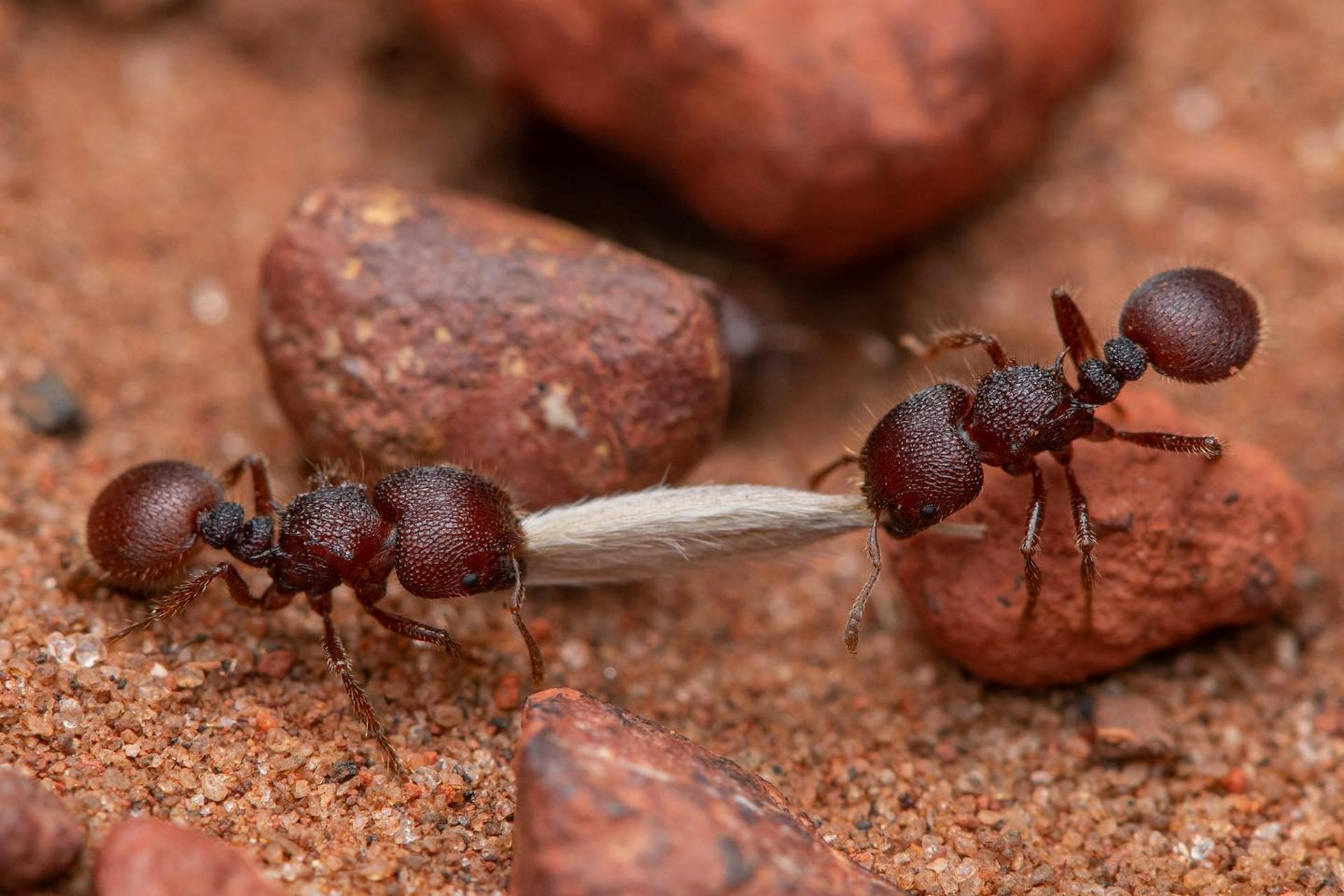
Many ant species are important seed dispersers. Here, two worker Meranoplus ants carry a seed back to their nest.
Credit: Francois Brassard
There are more than 15,700 named species and subspecies of ants, and many others not yet named by science. Ants’ high degree of social organisation has enabled them to colonise nearly all ecosystems and regions around the globe.
The astounding ubiquity of ants has prompted many naturalists to
contemplate their exact number on Earth. But these were basically educated guesses. Systematic, evidence-based estimates have been lacking.
Our research involved an analysis of 489 studies of ant populations conducted by fellow ant scientists from around the world. This included non-English literature, in languages such as Spanish, French, German, Russian, Mandarin and Portuguese.
The research spanned all continents and major habitats including forests, deserts, grasslands and cities. They used standardised methods for collecting and counting ants such as pitfall traps and leaf litter samples. As you can imagine, this is often tedious work.

A researcher installs a pitfall trap, a standard method for collecting ants that crawl across the ground surface.
Credit: Francois Brassard
From all this, we estimate there are approximately 20 quadrillion ants on Earth. This figure, though conservative, is between two and 20 times higher than previous estimates.
The previous figures employed a “top-down” approach by assuming ants comprise about 1% of the world’s estimated insect population. In contrast, our “bottom-up” estimate is more reliable because it uses data on ants observed directly in the field and makes fewer assumptions.
Our next step was to work out how much all these ants weigh. The mass of organisms is
typically measured in terms of their carbon makeup. We estimated that 20 quadrillion average-sized ants corresponds to a dry weight or “biomass” of approximately 12 million tonnes of carbon.
This is more than the combined biomass of wild birds and mammals – and about 20% of total human biomass.
Carbon makes up
about half the dry weight of an ant. If the weight of other bodily elements was included, the total mass of the world’s ants would be higher still.
We also found ants are distributed unevenly on Earth’s surface. They vary sixfold between habitats and generally peak in the tropics. This underscores the importance of tropical regions in maintaining healthy ant populations.
Ants were also particularly abundant in forests, and surprisingly, in arid regions. But they become less common in human-made habitats.
Our findings come with a few caveats. For example, the sampling locations in our dataset are unevenly distributed across geographic regions. And the vast majority of samples were collected from the ground layer, meaning we have very little information about ant numbers in trees or
underground. This means our findings are somewhat incomplete.
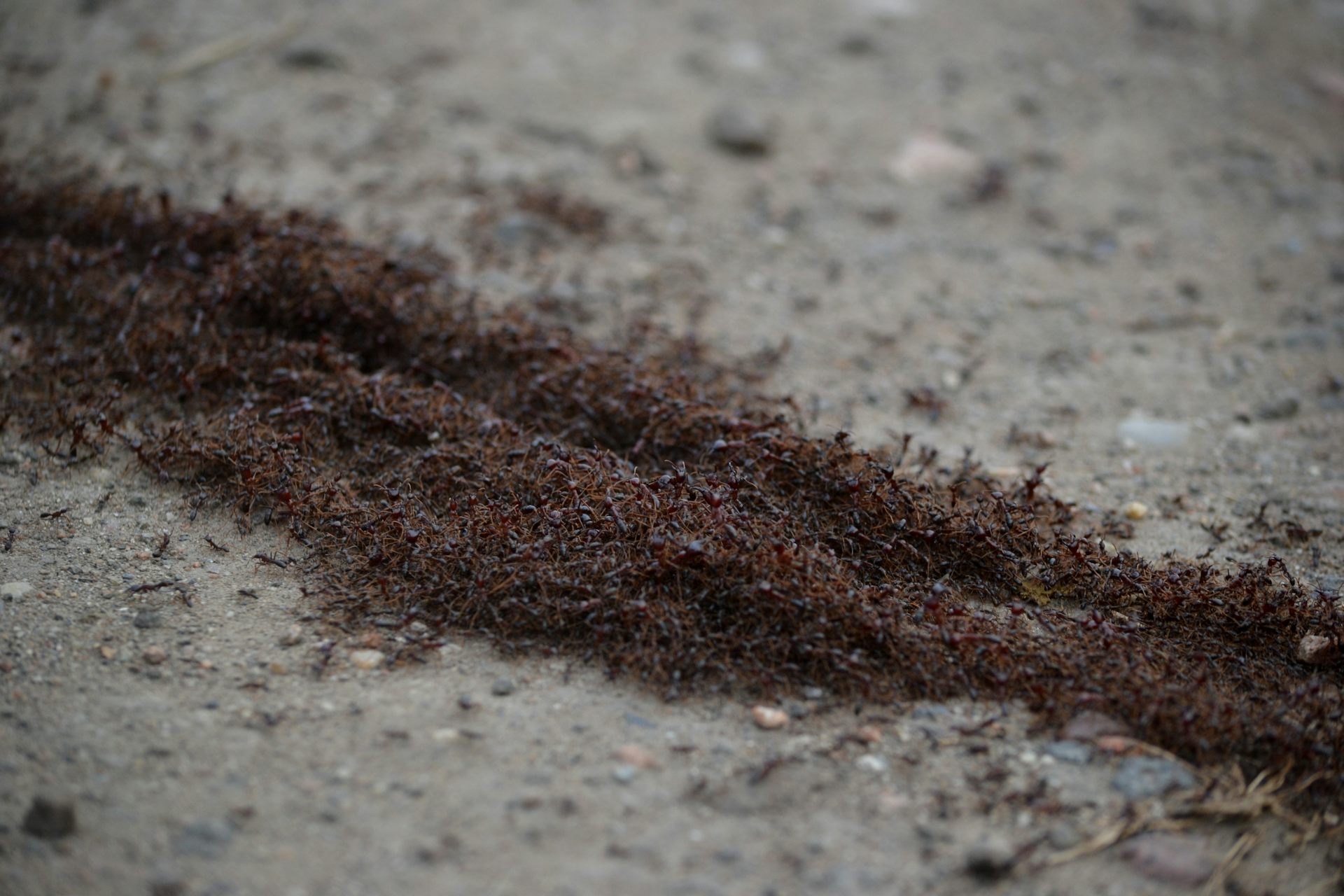
The new research found ants are distributed unevenly on Earth’s surface.
Credit: Shutterstock
Ants also provide vital “ecosystem services” for humans. For instance, a recent study
found ants can be more effective than pesticides at helping farmers produce food.
Ants have also developed tight interactions with other organisms – and some species cannot survive without them.
For example, some birds rely on ants to
flush out their prey. And thousands of plant species either
feed or house ants in exchange for protection, or dispersal of their seeds. And many ants are predators, helping to keep populations of other insects in check.
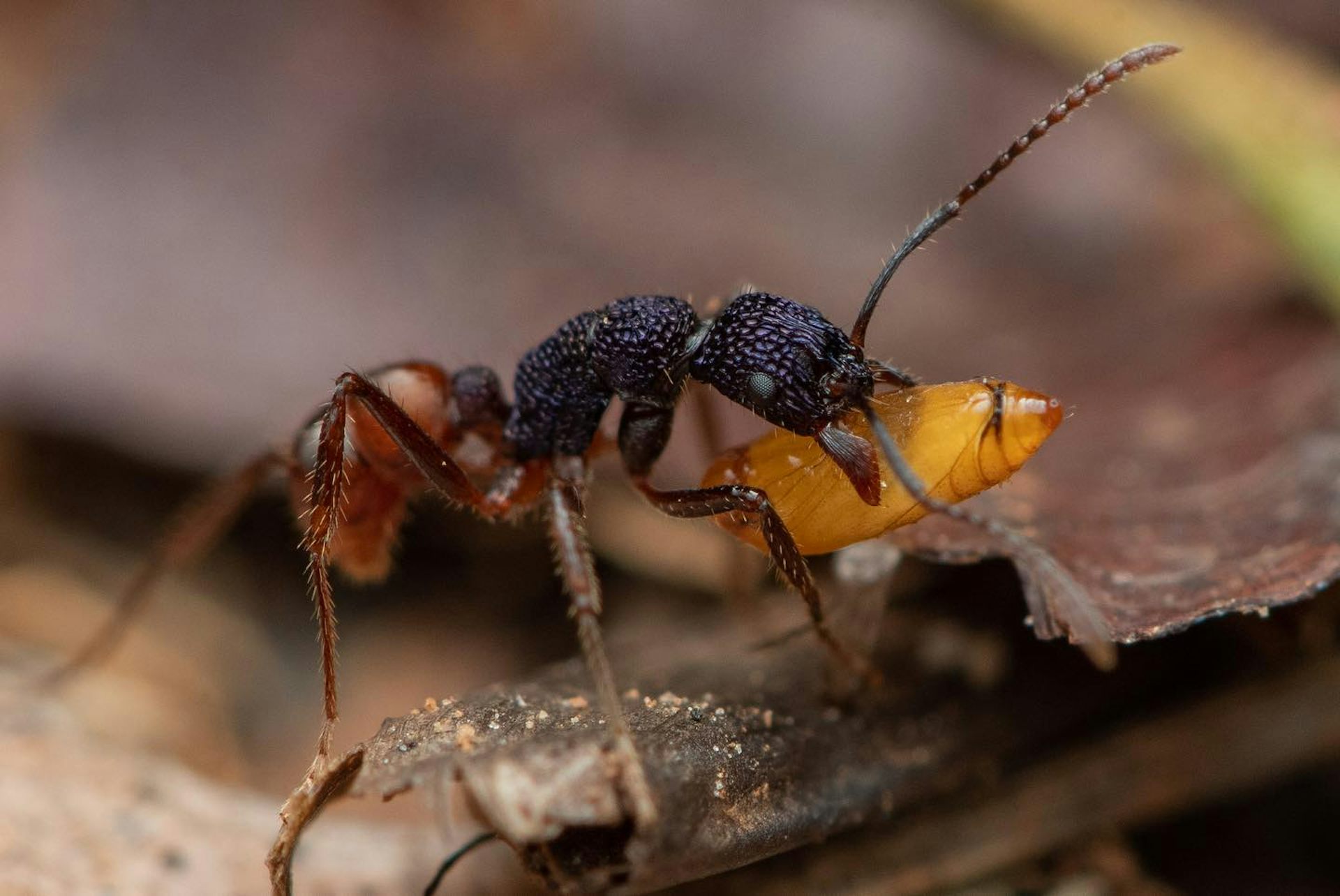
A purple Rhytidoponera ant carries her prey between her jaws. Many ants serve as predators that help keep populations of other insects in check.
Credit: Francois Brassard
Alarmingly, global insect numbers are
declining due to threats such as habitat destruction and fragmentation, chemical use, invasive species and climate change.
But data on insect biodiversity is alarmingly scarce. We hope our study provides a baseline for further research to help fill this gap.
It’s in humanity’s interest to monitor ant populations. Counting ants is not difficult, and citizen scientists from all over the world could help investigate how these important animals are faring at a time of great environmental change.
 Mark Wong
Mark Wong, Forrest Fellow,
The University of Western Australia;
Benoit Guénard, Associate professor,
University of Hong Kong;
François Brassard, PhD candidate,
Charles Darwin University;
Patrick Schultheiss, Temporary Principal Investigator,
Julius Maximilian University of Würzburg;
Runxi Wang, PhD candidate,
University of Hong Kong,
and
Sabine Nooten, Temporary Principal Investigator,
Julius Maximilian University of Würzburg
The team have published their findings in the journal PNAS. Although the main body of thr paper is behind a paywall, the abstract is pubished open access:
Significance
The astounding ubiquity of ants has prompted many naturalists to contemplate their exact number on Earth, but systematic and empirically derived estimates are lacking. Integrating data from all continents and major biomes, we conservatively estimate 20 × 1015 (20 quadrillion) ants on Earth, with a total biomass of 12 megatons of dry carbon. This exceeds the combined biomass of wild birds and mammals and equals 20% of human biomass. Ant abundance is distributed unevenly on Earth, peaking in the tropics and varying sixfold among habitats. Our global map of ant abundance expands our understanding of the geography of ant diversity and provides a baseline for predicting ants’ responses to worrying environmental changes that currently impact insect biomass.
Abstract
Knowledge on the distribution and abundance of organisms is fundamental to understanding their roles within ecosystems and their ecological importance for other taxa. Such knowledge is currently lacking for insects, which have long been regarded as the “little things that run the world”. Even for ubiquitous insects, such as ants, which are of tremendous ecological significance, there is currently neither a reliable estimate of their total number on Earth nor of their abundance in particular biomes or habitats. We compile data on ground-dwelling and arboreal ants to obtain an empirical estimate of global ant abundance. Our analysis is based on 489 studies, spanning all continents, major biomes, and habitats. We conservatively estimate total abundance of ground-dwelling ants at over 3 × 1015 and estimate the number of all ants on Earth to be almost 20 × 1015 individuals. The latter corresponds to a biomass of ∼12 megatons of dry carbon. This exceeds the combined biomass of wild birds and mammals and is equivalent to ∼20% of human biomass. Abundances of ground-dwelling ants are strongly concentrated in tropical and subtropical regions but vary substantially across habitats. The density of leaf-litter ants is highest in forests, while the numbers of actively ground-foraging ants are highest in arid regions. This study highlights the central role ants play in terrestrial ecosystems but also major ecological and geographic gaps in our current knowledge. Our results provide a crucial baseline for exploring environmental drivers of ant-abundance patterns and for tracking the responses of insects to environmental change.
Schultheiss, Patrick; Nooten, Sabine S.; Wang, Runxi; Wong, Mark K. L.; Brassard, François; Guénard, Benoit
The abundance, biomass, and distribution of ants on Earth
Proceedings of the National Academy of Sciences (2022) 119(40); e2201550119; DOI: 10.1073/pnas.2201550119

Copyright: © 2022 The authors.
Published by PNAS
. Open access
Reprinted under a
Creative Commons Attribution-NonCommercial-NoDerivatives License 4.0 (CC BY-NC-ND)
With the exception of a few nasty ants such as the vicious bullet and fire ants, most species are harmless and even beneficial. In the UK we have the very common black garden ant that, when the conditions are right in Spring and Summer - the right humidity and a high pressure weather system to help with flying - have a nuptial flight when the winged unmated females and smaller males all take flight at the same time from several different nests in the area. The males pursue the female, and the winner gets to mate with her. He then dies, as do all the others who lost the race. The female lands, sheds her wings and looks for somewhere to build a nest and start a new colony. This gives rise to panic and complaints about an invasion of 'flying ants', and the hardware shops have a run on ant power. One very silly neighbour we once had used to spray ant powder along our adjoining fence because she believed all the ants in her garden had come from ours! People even pour boiling water on them!
And yet these are harmless unless you annoy them then they can give a mild sting, more like a pinprick, really. They are incredibly useful in gardens where they account for thousands of caterpillars. Please treat them with respect. If they do come into your house, look upon them as cleaners because they'll be finding food crumbs and spilt sugar, etc. Keeping the floor and surfaces clean, and keeping food covered in sealed containers, will mean you won't get visits.
We need our ants - all 20 quadrillion of them!
Thank you for sharing!








